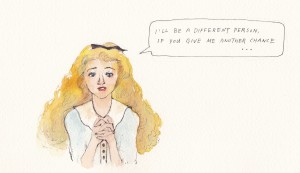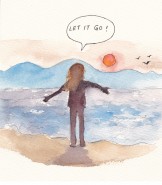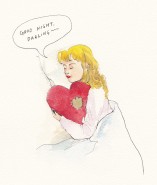With Valentine’s Day fast approaching, love is in the air whether our response is infatuation or nauseation. For those of you experiencing adverse reactions, here’s seven albums for even the worst of situations. After all, what better way to deal with heartbreak or emotional turmoil than self-torture in a dimly lit room with a fitting soundtrack and a glass (or bottle) of wine?
STAGE ONE: DESPERATE FOR ANSWERS
Birdy—Beautiful Lies (Indie pop)
 According to clinical psychologist Suzanne Lachmann, during the first stage of heartbreak, “The drive to know is consuming and can come at the expense of rational thoughts and behaviours.” Birdy’s third studio album experiments with a range of sound to complement the empti- ness and confusion of this initial stage. Hints of techno are infused with the vocal purity that we’re used to hearing from her. What makes this album stand out amongst others like it, however, are the echoes and reverberations that give it the spatial quality to match our irrational thoughts and shattered hearts. Fun times ahead indeed.
According to clinical psychologist Suzanne Lachmann, during the first stage of heartbreak, “The drive to know is consuming and can come at the expense of rational thoughts and behaviours.” Birdy’s third studio album experiments with a range of sound to complement the empti- ness and confusion of this initial stage. Hints of techno are infused with the vocal purity that we’re used to hearing from her. What makes this album stand out amongst others like it, however, are the echoes and reverberations that give it the spatial quality to match our irrational thoughts and shattered hearts. Fun times ahead indeed.
STAGE TWO: DENIAL
Alexandra Pohran Dawkins — Schumann Romances (Classical)
 A faculty member of UVic’s School of Music, Pohran Dawkins brings an instrumental album containing rich melody and undeniable warmth, in addition to an impeccable performance on the oboe. It will have you teary-eyed in no time as you rehash all the memories that make it impos- sible to believe that it’s over. (In fact, Dawkins herself once told me that you couldn’t play these if you hadn’t experienced heartbreak before.)
A faculty member of UVic’s School of Music, Pohran Dawkins brings an instrumental album containing rich melody and undeniable warmth, in addition to an impeccable performance on the oboe. It will have you teary-eyed in no time as you rehash all the memories that make it impos- sible to believe that it’s over. (In fact, Dawkins herself once told me that you couldn’t play these if you hadn’t experienced heartbreak before.)
STAGE THREE: BARGAINING
Majid Jordan—Majid Jordan (R&B)
 The up-and-coming Canadian R&B duo captures the essence of this stage flawlessly. After co-producing Drake’s “Hold On, We’re Going Home” in 2013, their debut studio album gives us a false sense of strength with insistent beats and pleading lyrics. During this stage, part of us begins to accept that it could be over for good, while the other part is still putting up a fight. Don’t be fooled by the club music rhythms found throughout this album—it’s full of painful emotional undertones typical of R&B, much like this stage of heartbreak.
The up-and-coming Canadian R&B duo captures the essence of this stage flawlessly. After co-producing Drake’s “Hold On, We’re Going Home” in 2013, their debut studio album gives us a false sense of strength with insistent beats and pleading lyrics. During this stage, part of us begins to accept that it could be over for good, while the other part is still putting up a fight. Don’t be fooled by the club music rhythms found throughout this album—it’s full of painful emotional undertones typical of R&B, much like this stage of heartbreak.
STAGE FOUR: RELAPSE
Tigers Jaw—Tigers Jaw (Rock)
 When you’ve convinced yourself that you’re so over them, here’s an album that gets you second-guessing everything. Laced with pent-up frustration, Tigers Jaw is 30 minutes of everything you feel but can’t quite bring yourself to say. Between bassist Dennis Mishko and Pat Brier on drums, there’s a sense of drive that keeps you involved from beginning to end. But perhaps the highlight of this album is in the bluntness found in lyrics like: “in the end it never mat- ters what I think,” and “I’d like to think I can work it out some / but I want to be put into the ground.” Prepare to get wrecked.
When you’ve convinced yourself that you’re so over them, here’s an album that gets you second-guessing everything. Laced with pent-up frustration, Tigers Jaw is 30 minutes of everything you feel but can’t quite bring yourself to say. Between bassist Dennis Mishko and Pat Brier on drums, there’s a sense of drive that keeps you involved from beginning to end. But perhaps the highlight of this album is in the bluntness found in lyrics like: “in the end it never mat- ters what I think,” and “I’d like to think I can work it out some / but I want to be put into the ground.” Prepare to get wrecked.
STAGE FIVE: ANGER
Katatonia—Dead End Kings (Progressive metal)
 As love transforms to hatred, allow me to introduce you to a band that bridges the gap between metal and progressive rock. Anger and accusation are presented through cryptic metaphors and a passionate performance. Lead vocalist Jonas Renske performs with such emotional sincerity that this is definitely the album to rage to when you finally shift the blame (and convince yourself and everyone around you how much you hate your ex).
As love transforms to hatred, allow me to introduce you to a band that bridges the gap between metal and progressive rock. Anger and accusation are presented through cryptic metaphors and a passionate performance. Lead vocalist Jonas Renske performs with such emotional sincerity that this is definitely the album to rage to when you finally shift the blame (and convince yourself and everyone around you how much you hate your ex).
STAGE SIX: INITIAL ACCEPTANCE
Joni Mitchell—Clouds (Folk)
 Here’s a legendary album that reminds us to let go of the past, embrace the present, and prepare for an unknown future. Referred to over the years as a “contemplative album,” we are taken on a journey of romance (“The Gallery” and “Roses Blue”), of hope and happiness (“Chelsea Morning”), and everything in between, until arriving to an awakening conclusion (“Both Sides Now”). The singer-songwriter queen plays with unconventional harmonies and tried and true words of wisdom. To quote the last song of the album, “I’ve looked at love from both sides now / from give and take / and still somehow / it’s love’s illusions I recall / I really don’t know love at all.”
Here’s a legendary album that reminds us to let go of the past, embrace the present, and prepare for an unknown future. Referred to over the years as a “contemplative album,” we are taken on a journey of romance (“The Gallery” and “Roses Blue”), of hope and happiness (“Chelsea Morning”), and everything in between, until arriving to an awakening conclusion (“Both Sides Now”). The singer-songwriter queen plays with unconventional harmonies and tried and true words of wisdom. To quote the last song of the album, “I’ve looked at love from both sides now / from give and take / and still somehow / it’s love’s illusions I recall / I really don’t know love at all.”
STAGE SEVEN: REDIRECTED HOPE
Doc Watson—Southbound (Blues)
 “As acceptance deepens, moving forward requires redirecting your feelings of hope . . . to the possibility that you just might be okay without your ex,” says Lachmann. After all the turmoil, we come to realize our potential to be happy regardless of what has happened and what may happen in the future. Celebrate with the slightly intoxicating sound of blues in Doc Watson’s Southbound, featuring two other guitarists and a double bassist in addition to Doc himself. With a career spanning several decades and 38 studio albums, he may just be the refresher you’ve been looking for. Even if you don’t think blues, bluegrass, or country is for you, I urge you to try something completely different to mirror the newfound change in your life.
“As acceptance deepens, moving forward requires redirecting your feelings of hope . . . to the possibility that you just might be okay without your ex,” says Lachmann. After all the turmoil, we come to realize our potential to be happy regardless of what has happened and what may happen in the future. Celebrate with the slightly intoxicating sound of blues in Doc Watson’s Southbound, featuring two other guitarists and a double bassist in addition to Doc himself. With a career spanning several decades and 38 studio albums, he may just be the refresher you’ve been looking for. Even if you don’t think blues, bluegrass, or country is for you, I urge you to try something completely different to mirror the newfound change in your life.
Because ultimately, that’s what it’s all about.







